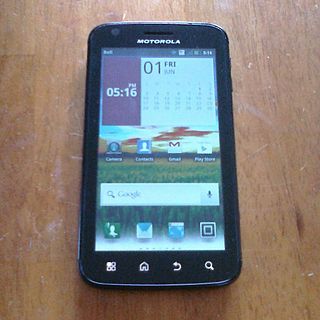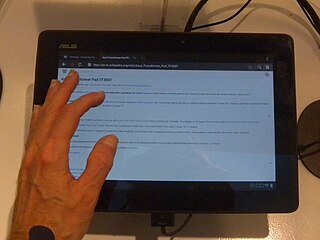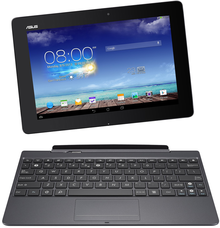
Asus Eee is a family of products by AsusTek Computer Inc. The product family began with the release of the Eee PC subnotebook in 2007; since then, the product family has diversified into a number of PC form factors. According to the company, the name Eee derives from "the three Es," an abbreviation of its advertising slogan for the device: "Easy to learn, Easy to work, Easy to play".
Google Nexus is a discontinued line of consumer electronic mobile devices that ran a stock version of the Android operating system. Google managed the design, development, marketing, and support of these devices, but some development and all manufacturing were carried out by partnering with original equipment manufacturers (OEMs). Alongside the main smartphone products, the line also included tablet computers and streaming media players; the Nexus started out in January 2010 and reached its end in October 2016, replaced by Google Pixel family.

The Nook Color is a tablet computer/e-reader that was marketed by Barnes & Noble. A 7-inch (18 cm) tablet with multitouch touchscreen input, it is the first device in the Nook line to feature a full-color screen. The device is designed for viewing of books, newspapers, magazines, and children's picture books. A limited number of the children's books available for the Nook Color include interactive animations and the option to have a professional voice actor read the story. It was announced on 26 October 2010 and shipped on 16 November 2010. Nook Color became available at the introductory price of US$249. In December 2011, with the release of the Nook Tablet, it lowered to US$169. On 12 August 2012, the price lowered to US$149. On 4 November 2012, the price was further lowered to US$139. The tablet ran on Android.

The ViewSonic G Tablet is an Android-based tablet produced by ViewSonic Corporation, a manufacturer and provider of visual technology. It first appeared for consumer purchase at Sears on 1 November 2010.

The Motorola Atrix 4G is an Android-based smartphone developed by Motorola, introduced at CES 2011 along with the Motorola Xoom, Motorola Droid Bionic, and Motorola Cliq 2 on January 5, 2011. It was made available in the first quarter of 2011.

The HP TouchPad is a tablet computer that was developed and designed by Hewlett-Packard. The HP TouchPad was launched on July 1, 2011, in the United States; July 15 in Canada, United Kingdom, France, Germany; and August 15 in Australia.

The Asus Eee Pad Transformer TF101 is a 2-in-1 detachable tablet developed by Asus that runs the Android operating system. It is the first tablet in the Asus Transformer Pad series. The Eee Pad Transformer features a 10.1-inch (260 mm) display, an Nvidia Tegra 2 dual-core chip, 1 GB of RAM, and 16 or 32 GB of storage. The tablet initially launched with Android 3.1, nicknamed "Honeycomb", but was updated to support Android 4.0.3.

The Acer Iconia A500 is a tablet computer designed, developed and marketed by Acer Inc. The A500 launched with the Android Honeycomb operating system which is now upgradable to Ice Cream Sandwich 4.0.3. The tablet is also sold in almost identical form as the Packard Bell Liberty Tab G100.

The Acer Iconia is a range of tablet computers from Acer Inc. of Taiwan.
The Samsung Galaxy R (Royal) (GT-I9103) is an Android smartphone that was announced by Samsung on August 10, 2011 as a variant to the Samsung Galaxy S II.

The Asus Eee Pad Transformer TF201 or Asus Eee Pad Transformer Prime is a 2-in-1 detachable tablet from the Asus Transformer Pad series. It is the world's first Android tablet computer with a quad-core processor, and a successor to the dual-core Asus Eee Pad Transformer. It runs Android 4.1. The Transformer Prime was announced by Asus on 9 November 2011. It was released in Taiwan on 1 December 2011, and in Canada and the United States during the week of 19 December 2011.
The IdeaPad tablets from Lenovo were a brand of consumer-oriented tablet computers designed for home use or entertainment, as opposed to the business-focused ThinkPad Tablet series. Devices sold in certain countries, such as China, India and New Zealand, were sold under the LePad brand, similar to the LePhone series of smartphones. IdeaPad-branded tablets have been produced with the Android and Windows operating systems.

The Sony Ericsson Xperia ray (ST18i) is an Android smartphone from Sony Ericsson. It was unveiled on 22 June 2011 in Singapore during CommunicAsia 2011. It was announced that the Xperia ray would be released globally in select countries from Q3 2011.

The Asus Transformer Pad TF300T is a 2-in-1 detachable tablet from the Asus Transformer Pad series. It runs Android, has a quad-core processor, and a successor to Asus Eee Pad Transformer Prime. The Transformer design includes an optional docking keyboard. The Asus Transformer Pad TF300T was released on the market in the U.S. and Europe in May 2012.
Asus Transformer Pad TF700T or Asus Transformer Pad Infinity - is a tablet computer made by Asus, successor to the Asus Transformer Prime. The manufacturer announced it at CES 2012, less than a month after the original product launch, to launch Q2 2012.

The Nexus 10 is a tablet computer co-developed by Google and Samsung Electronics that runs the Android operating system. It is the second tablet in the Google Nexus series, a family of Android consumer devices marketed by Google and built by an OEM partner. Following the success of the 7-inch Nexus 7, the first Google Nexus tablet, the Nexus 10 was released with a 10.1-inch, 2560×1600 pixel display, which was the world's highest resolution tablet display at the time of its release. The Nexus 10 was announced on October 29, 2012, and became available on November 13, 2012.

OmniROM is an open-source operating system for smartphones and tablet computers, based on the Android mobile platform. It involves a number of prominent developers from other projects.

The Sony Xperia Z4 Tablet is a touchscreen Android tablet manufactured and designed by Sony Mobile. Unlike its predecessor, the Xperia Z4 tablet features a 2560 × 1600 resolution 10.1-inch screen and is water and dustproof with a rating of IP65 and IP68. The tablet is lighter and thinner than its predecessor, weighing at 0.85 pound (389 g) for the WiFi model and 0.86 pound (393 g) for the LTE model and is 0.24 inches (6.1 mm) thick. The Z4 Tablet features the Snapdragon 810 processor and WQXGA resolution screen. It was announced on 2 March 2015 in a press conference held by Sony alongside the Sony Xperia M4 Aqua during the 2015 Mobile World Congress in Barcelona, Spain.
LG Optimus L70 is a slate smartphone designed and manufactured by LG Electronics. The LG L70 is the mid-range handset in the L series.
Samsung Galaxy Star 2 Plus G350E is a smartphone manufactured by Samsung Electronics that runs on the open source Android operating system. Announced by Samsung in early August 2014. It has additional software features, expanded hardware, and a redesigned physique from its predecessor, the Samsung Galaxy Star 2.












